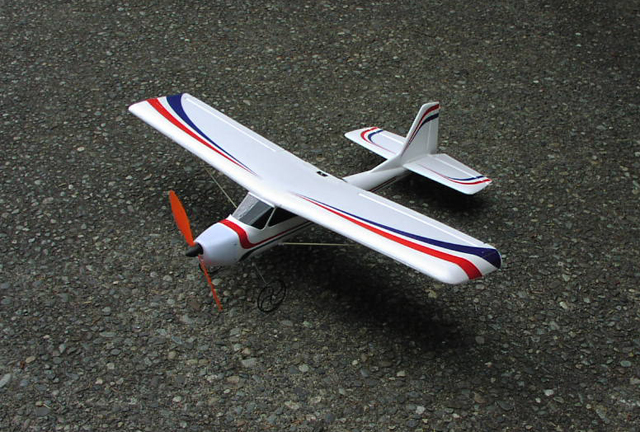GWS E-Starter
| Not a bad little foamie |
General Specifications
Build Date - April 2003
| Airframe Type - | Top Wing | Flying Type - | Foamie Trainer | |
| Wingspan = | 38 inches | Length = | 30.5 inches | |
| Wing Area = | 265 sq. inches | All-Up Weight = | 16.9 ounces | |
| Motor - | GWS 300C Geared 4.1:1 | Wing Load = | 9.0 oz/sq. ft. | |
| Propellor - | 10 x 8 GWS Orange | Power = | 60+ watts | |
| Thrust = | 11.9 ounces | Thrust/Weight = | .70 | |
| Battery Type - | Nimh 7cell | Capacity = | 700 mah | |
| Speed Control - | GWS 10 amp | BEC - | Integral |
Commentary
How appropriate that this plane is named the E-Starter. After doing some looking around, I picked this plane to be my first electric and to get me back into the RC hobby after many years. It's a great little plane, easy to put together and easy to fly. If built with ailerons, it is additionally a good aileron trainer.
This plane is considered a "Foamy". That is, it is made entirely out of a type of styra-foam. The kit is very easy to put together requiring about 3 or 4 hours. The instructions are top notch and written very much for the novice. The supplied power system (GWS EPS300C) is more than adequate and lasted many, many flights and "hard" landings. The recommended Nimh battery pack would give up after about ten minutes of flight time which was plenty.
I also went with all GWS gear as recommended in the manual, including their servos, receiver and speed control. It all performed above expectations and was very reasonably priced. A really good (2008) place to buy the plane and related components is Balsa Products who have great prices and wonderful service.
In flight, this plane was well balanced, could do many aerobatic maneuvers and was very recoverable when things didn't go just right. Take-offs were 30 feet or less and with the standard oversize spoke wheels, grass or rough ground was never an issue. The area needed was never more than the local elementary school ball field and this is where I flew this plane exclusively.
I did crash or tumble this plane a few times from making mistakes at low altitude or while landing (remember - always fly three mistakes above your abilities!) but repairs were easy with foam safe glue and I was always back in the air in an hour or so. It did OK in a light breeze, but choppy wind was a challenge.
This plane is now happily retired, hanging from the shop ceiling. -:)
- Buy recommendation - Absolutely
- Build skill - Novice (Foamy)
- Pilot skill - Novice (Aileron trainer)
- Lesson learned - Bring extra props battery packs and buy an extra motor shaft or two, you'll have a blast!
